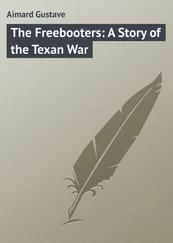Gustave Aimard - The Border Rifles - A Tale of the Texan War
Здесь есть возможность читать онлайн «Gustave Aimard - The Border Rifles - A Tale of the Texan War» — ознакомительный отрывок электронной книги совершенно бесплатно, а после прочтения отрывка купить полную версию. В некоторых случаях можно слушать аудио, скачать через торрент в формате fb2 и присутствует краткое содержание. Жанр: foreign_prose, foreign_adventure, foreign_language, на английском языке. Описание произведения, (предисловие) а так же отзывы посетителей доступны на портале библиотеки ЛибКат.
- Название:The Border Rifles: A Tale of the Texan War
- Автор:
- Жанр:
- Год:неизвестен
- ISBN:нет данных
- Рейтинг книги:5 / 5. Голосов: 1
-
Избранное:Добавить в избранное
- Отзывы:
-
Ваша оценка:
- 100
- 1
- 2
- 3
- 4
- 5
The Border Rifles: A Tale of the Texan War: краткое содержание, описание и аннотация
Предлагаем к чтению аннотацию, описание, краткое содержание или предисловие (зависит от того, что написал сам автор книги «The Border Rifles: A Tale of the Texan War»). Если вы не нашли необходимую информацию о книге — напишите в комментариях, мы постараемся отыскать её.
The Border Rifles: A Tale of the Texan War — читать онлайн ознакомительный отрывок
Ниже представлен текст книги, разбитый по страницам. Система сохранения места последней прочитанной страницы, позволяет с удобством читать онлайн бесплатно книгу «The Border Rifles: A Tale of the Texan War», без необходимости каждый раз заново искать на чём Вы остановились. Поставьте закладку, и сможете в любой момент перейти на страницу, на которой закончили чтение.
Интервал:
Закладка:
"That is a good idea, Chief; but, since you have been driven from your village, have you not kept spies round the Americans, in order to be informed of their actions? that was important for the success of your further plans."
Black-deer smiled, but made no other answer, whence the Canadian concluded that the Redskin had, with the sagacity and prudence which characterize his race, taken all the necessary precautions to insure the success of the blow he was about to deal at the new clearing.
Tranquil, owing to his semi-Indian education, and the hereditary hatred which, as a true Canadian, he bore to the Anglo-Saxon race, was perfectly well inclined to help the Pawnee Chief in taking an exemplary vengeance on the Americans for the insults he had received at their hands; but with that correctness of judgment which formed the basis of his character, he did not wish to let the Indians indulge in those atrocious cruelties, to which they only too often yield in the first intoxication of victory. Hence the determination he formed had a double object – in the first place, to insure as far as he could the success of his friends, and, secondly, to employ all the influence he possessed over them, to restrain them after the battle, and prevent them satiating their vengeance on the conquered, and, above all, on the women and children.
As we have seen, he did not attempt to conceal his object from Black-deer, and laid down as the first condition of his co-operation, which the Indians would be delighted to receive, that no unnecessary cruelty should be committed.
Quoniam, for his part, did not make any stipulation; a natural enemy of the Whites, and specially of the North Americans, he eagerly seized the occasion of dealing them as much injury as possible, and avenging himself for the ill treatment he had experienced, without taking the trouble to reflect that the people he was about to fight were innocent in the matter of his wrong; these individuals were North Americans, and that reason was more than sufficient to justify, in the sight of the vindictive Negro, the conduct he proposed to carry out when the moment arrived.
After a few minutes the Canadian spoke again.
"Where are your warriors?" he asked the Chief.
"I left them three suns' march from the spot where we now are; if my brother has nothing to keep him longer here, we will set out immediately, in order to join them as soon as possible, for my return is impatiently expected by the warriors."
"Let us go," the Canadian said; "the day is not yet far advanced, and it is needless for us to waste our time in chattering like curious old women."
The three men rose, drew on their belts, walked hastily along the path formed by the manada through the forest, and soon disappeared under its covert.
CHAPTER VI
THE CLAIM
We will now leave our three travellers for a while, and employing our privilege of narrator, transfer the scene of our story a few hundred miles away, to a rich and verdant valley of the Upper Missouri, that majestic river, with its bright and limpid waters, on the banks of which now stand so many flourishing towns and villages, and which magnificent steamboats furrow in every direction, but which, at the period when our story opens, was almost unknown, and only reflected in the mirror of its waters the lofty and thick frondage of the gloomy and mysterious virgin forests that covered its banks.
At the extremity of a fork, formed by two rather large affluents of the Missouri, stretches out a vast valley, bordered on one side by abrupt mountains, and on the other by a long line of wooded hills.
This valley, almost entirely covered with thick forests, full of game of every description, was a favourite gathering-place of the Pawnee Indians, a numerous tribe of whom, the Snakes, had established their abode in the angle of the fork, in order to be nearer their hunting-grounds. The Indian village was rather large, for it counted nearly three hundred and fifty fires, which is enormous for Redskins, who usually do not like to collect in any considerable number, through fear of suffering from famine. But the position of the village was so well chosen, that in this instance the Indians had gone out of their usual course; in fact, on one side the forest supplied them with more game than they could consume; on the other, the river abounded with deliciously tasted fish of every description; while the surrounding prairies were covered throughout the year with a tall close grass, that supplied excellent pasturage for their horses.
For several centuries the Snake Pawnees had been settled in this happy valley, which, owing to its sheltered position on all sides, enjoyed a soft climate, exempt from those great atmospheric perturbations which so frequently disturb the high American latitudes. The Indians lived there quiet and unknown, occupying themselves with hunting and fishing, and sending annually small bodies of their young men to follow the war-trail, under the most renowned chiefs of the nation.
All at once this peaceful existence was hopelessly disturbed; murder and arson spread like a sinister winding-sheet over the valley; the village was utterly destroyed, and the inhabitants were pitilessly massacred.
The North Americans had at length gained knowledge of this unknown Eden, and, in their usual way announced their presence on this remote nook of earth, and their taking possession of it by theft, rapine, and assassination.
We will not repeat here the story Black-deer told the Canadian, but confine ourselves to the assertion that it was in every point true, and that the Chief, in telling it, far from rendering it more gloomy by emphatic exaggeration, had, on the contrary, toned it down with uncommon justice and impartiality.
We will enter this valley three months after the arrival of the Americans which proved so fatal to the Redskins, and describe, in a few words, the way in which they formerly had established themselves on the territory from which they so cruelly expelled the legitimate owners.
Hardly had they become uncontested owners of the soil, than they commenced what is called a clearing.
The government of the United States had, about forty years ago, and probably still has, a habit of requiting the services of old officers, by making them concessions of land on those frontiers of the Republic most threatened by the Indians. This custom had the double advantage of gradually extending the limits of the American territory by driving back the Indians into the desert, and of not abandoning in their old days soldiers who during the greater portion of their life had shed their blood nobly for their country.
Captain James Watt was the son of an officer who distinguished himself in the war of Independence. Colonel Lionel Watt, aide-de-camp to Washington, had fought by the side of that celebrated founder of the Republic in all the battles against the English. Seriously wounded at the siege of Boston, he had been, to his great regret, compelled to retire into private life; but, faithful to his principles, so soon as his son James reached his twentieth year, he made him take his place under the flag.
At the period when we bring him on the scene, James Watt was a man of about five-and-forty, although he appeared at least ten years older, owing to the incessant fatigue of the exacting profession in which his youth had been passed.
He was a man of five feet eight, powerfully built, with broad shoulders, dry, muscular, and endowed with an iron health; his face, whose lines were extremely rigid, was imprinted with that expression of energetic will, blended with carelessness, which is peculiar to those men whose existence has been only one continual succession of dangers surmounted. His short grey hair, his bronzed complexion, black and piercing eyes, his well-chiselled mouth, gave his face an expression of inflexible severity, which was not deficient in grandeur.
Читать дальшеИнтервал:
Закладка:
Похожие книги на «The Border Rifles: A Tale of the Texan War»
Представляем Вашему вниманию похожие книги на «The Border Rifles: A Tale of the Texan War» списком для выбора. Мы отобрали схожую по названию и смыслу литературу в надежде предоставить читателям больше вариантов отыскать новые, интересные, ещё непрочитанные произведения.
Обсуждение, отзывы о книге «The Border Rifles: A Tale of the Texan War» и просто собственные мнения читателей. Оставьте ваши комментарии, напишите, что Вы думаете о произведении, его смысле или главных героях. Укажите что конкретно понравилось, а что нет, и почему Вы так считаете.












